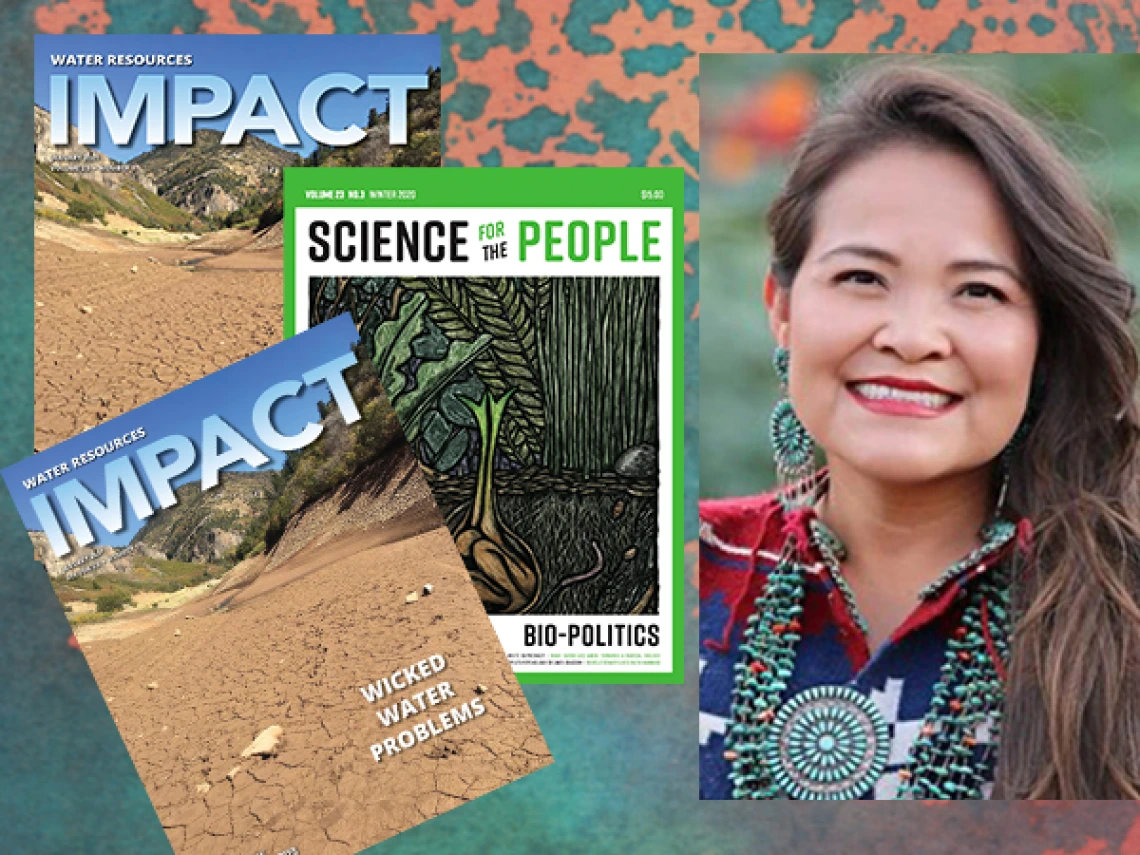Dr. Karletta Chief in the News

Dr. Karletta Chief recently published three articles in news magazines: two in the January 2021 issue of Water Resources IMPACT Magazine (digital) and one in the Winter 2020 issue of Science for the People Bio-Politics.
The January 2021 issue of Water Resources IMPACT Magazine contains a series of articles on how to understand water problems affecting the Navajo Nation, where water insecurity is widespread. The first article, co-authored by Dr. Karletta Chief, discusses the unique challenges that the COVID-19 pandemic has added to the Navajo Nation’s mix of longstanding water problems and the range of efforts that are underway to address them.
On the Navajo Nation, where a great number of people lack access to indoor plumbing and must haul their water, it is an enormous challenge to adhere to the hand-washing guidelines from the Centers for Disease Control and Prevention (CDC). Therefore, the Coronavirus Aid, Relief, and Economic Security (CARES) Act provided funding for states and tribes to help relieve severe pandemic impacts. The United States Indian Health Service (IHS) quickly mobilized and constructed transitional water points across the Navajo Nation, distributed water containers and disinfection tablets. The construction of these watering points was facilitated by interagency collaboration among tribal, federal, state, university, and nonprofit allies through the development of the Navajo Nation COVID-19 Water Access Coordination Group (NNWACG).
This article ends by stating that “during a global pandemic, a Navajo person should not have to choose between washing their hands to prevent contracting COVID-19 or drinking clean water for their healthy survival.”
The second article within the issue of Water Resources IMPACT by Dr. Karletta Chief, et al., talks about the innovative partnership designed to provide water purification and greenhouse capacity to enhance resilience and quality of life of the Navajo Nation.
This article talks about how COVID-19 has amplified Food, Energy and Water (FEW) insecurities across the world and disproportionately impacted Indigenous communities. Since 2017 the University of Arizona has partnered with the Diné College to develop solar powered water treatment and greenhouse units to address FEW challenges on the Navajo Nation while training graduate students and tribal college students through the Indige FEWSS program.
The article describes the actions taken by this University-community partnership and concludes by saying that through these partnerships involving robust community engagement, technologies can be deployed in remote locations as well as more urbanized locations.
The third article by Dr. Chief, et al., from Science for the People Bio-Politics, talks about how the Native Americans are misrepresented in health data and pay a heavy COVID-19 price. This the article argues how any COVID-19 treatment strategy to be effective, epidemiologists and public health authorities must grapple with their own complicity in these socioeconomic disparities and racial inequalities.
The article ends with a quote from Abigail Echo-Hawk, director of the Urban Indian Health Institute (UIHI) based in Seattle: “American Indians and Alaska Natives were once the healthiest people in these lands,” but colonial histories have directly contributed to the unacceptable vulnerabilities and risks that Indigenous peoples continue to endure with this pandemic. If we fail to grapple with this, the next virus will inevitably blaze another deadly trail among Indigenous peoples, as COVID-19 is doing now, and as so many other diseases have done in the past.
Publications:
Chief, K., R. Arnold, A. Curley, J. Hoover, M. Kacira, V. Karanikola, K. Simmons-Potter, and E. Tellman. 2021. Addressing food-energy-water insecurities of the Navajo Nation through university-community collaboration. In Megdal, S. and L. Beutler (ed.) Wicked Water Problems. Water Resources IMPACT Magazine 23(1):31-33. https://online.flippingbook.com/view/167753/32/
Tulley-Cordova, C., N. Tulley, B. Becker, and Chief, K. 2021. Chronic wicked water problems in the Navajo Nation heightened by the COVID-19 pandemic. In Megdal, S. and L. Beutler (ed.) Wicked Water Problems. Water Resources IMPACT Magazine 23(1):16-18. https://online.flippingbook.com/view/167753/16/
Johns, B., M. Caslin, M. Lewis, K. Chief, and M. Katti. 2021. Settler colonialism and pandemics: Native Americans misrepresented in health data pay a heavy COVID-19 price. Science for the People Biopolitics 23(3): 11-15. https://magazine.scienceforthepeople.org/vol23-3-bio-politics/native-am…

